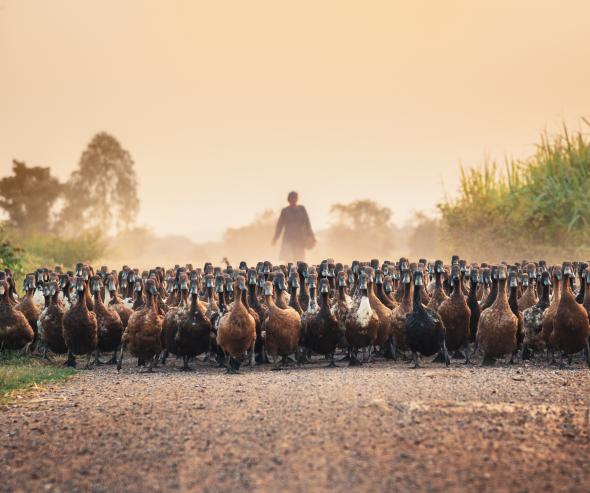Agrifood: The Autorité de la concurrence takes note of the decision taken by the Euralis and Maïsadour groups to withdraw their plans to create a joint venture in the fattened duck sector

Background
The Autorité notes the withdrawal announced by Euralis and Maïsadour of their plan to create a joint venture that would have brought together the Maïsadour Group's fat palmipeds smoked fish and food retail distribution activities, Delpeyrat and Comtesse du Barry and their subsidiaries, and the fat palmipeds and food retail distribution activities of the Euralis Group, carried out by Euralis Gastronomie and its subsidiaries.
This transaction could have presented high competitive risks, particularly in the downstream markets for the marketing of fattened duck products to mass retail distribution (hereafter "GMS") and out-of-home catering
(hereafter "RHF").
Parties to the transaction
Euralis is an agricultural cooperative company whose capital is owned by approximately
6,500 member farmers. It is active in the production and marketing of seeds and in a range of other activities linked to agriculture, livestock and animal production (cereals, vegetables, poultry, animal nutrition, agricultural supplies, etc.).
Maïsadour is also an agricultural cooperative owned by approximately 5,000 member farmers, with several subsidiaries active in seeds, cereals, agricultural supplies, vegetables, animal nutrition, livestock and animal production (poultry, fish, etc.).
In-depth examination of the transaction
This transaction was notified to the Autorité de la concurrence on 2 May 2022. In view of serious doubts regarding harm to competition in the downstream markets for the marketing of fattened duck products to supermarkets & hypermarkets (GMS) and out-of-home catering (RHF), the Autorité opened an in-depth examination of the proposed transaction in December 2022.
The Autorité carried out a detailed, wide-ranging analysis based on a survey of the parties, their competitors, suppliers and customers in the markets concerned by the transaction, and a review of the information provided by the parties. In particular, it noted that the joint venture would have had strong brands, very high market shares in numerous segments of the downstream markets for the marketing of fattened duck products to supermarkets & hypermarkets (GMS) and out-of-home catering (RHF), and a very significant share in the production and slaughtering of fattened ducks in France, in a sector severely impacted by avian flu. The Autorité also noted the absence of factors likely to discipline the behaviour of the new entity, due to the absence of sufficient current and potential competition, and the lack of credible alternative sources of supply for GMS and RHF distributors following the transaction[1].
[1] According to paragraphs 661 and 662 of the Autorité's merger control guidelines, a company's market power can be effectively limited by the negotiating power of buyers, provided that alternatives remain available. The Autorité rejects the systematic finding of the existence of countervailing power between distributors and their suppliers and carried out a case-by-case analysis in two stages. It checked, firstly, that distributors have alternative sources of supply and, secondly, that they can easily change suppliers. The countervailing power of demand only exists insofar as demand can threaten to turn to alternative sources of supply, within a reasonable timeframe, if the supplier decides to raise its prices.
Contact(s)
